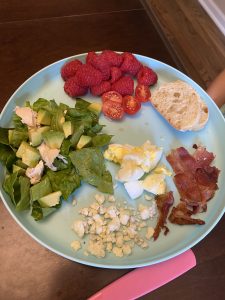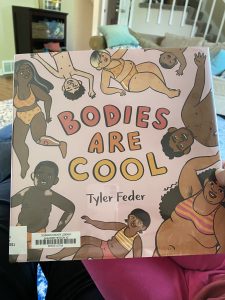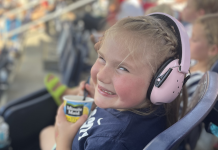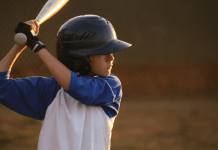I have struggled with my relationship with food since I was very young, but I internalized the idea that eating disorders are a thin person problem and that people in larger bodies didn’t have them.
As I became older the lies of diet culture led me to believe any issues I had with food were a personal failure to practice self control or make healthy choices. It all came to a head for me in a few years ago when I realized food issues were affecting my mental health. I shared more of my story about disordered eating in this post that I wrote in early 2020.
As I dealt with my own issues, I knew I needed to take a hard look at how I parent my own kids. I’ve tried to integrate some of the things I’ve learned in my own treatment.
Intuitive Eating
I practice the principles of intuitive eating, and my goal is to raise intuitive eaters. Babies are great intuitive eaters, most can recognize their hunger and fullness cues. As kids age they often become disconnected from recognizing those cues. The Division of Responsibility goes hand in hand with this strategy and helps me fed my kids in a way that they can pick up on their internal cues on hunger and fullness.

Division of Responsibility (DOR)
We try (keyword here is try) to follow DOR, the method from the Ellyn Satter Institute that helps reduce power struggles at meals. As parents, our job is to decide when, where, and what to serve. Their job as kids is to choose from what we serve them what and and how much to eat. We encourage them occasionally to “try new foods because they might taste good,” but our key phrase at dinner is “you don’t have to eat it if you don’t want to.” No matter what we serve we make sure there is always a safe food on their plate that we know they will eat (i.e. fruit, bread, plain pasta).
Joyful Movement
I was not athletic as a kid, and so far my kids don’t seem to be athletically inclined either. We try to encourage them to move their bodies in ways they enjoy. My youngest likes gymnastics, and my oldest loves swimming. We try to lead by example in this area and not push them to do things they are not interested in. This is still an area I struggle in and am working on finding joyful movement for myself.

Body Positivity/Body Neutrality
This might be the hardest battle to fight, especially when raising girls. The idea of body neutrality, that all bodies are GOOD bodies, is something I want my kids to embrace. I try to model this by talking about reasons I’m thankful for my body. Things like “my body is so amazing, it grew you and birthed you!” I know many of us try to not say negative things about our bodies around our kids, but taking it a step further and saying positive things about our bodies is so important, too, even if it feels kind of awkward. A couple of my favorite picture books for kids on this topic are Her Body Can by Kate Crenshaw and Ady Meschke and Bodies are Cool by Tyler Feder.
None of this is easy, and I need regular encouragement so I follow Nicole Cruz, RD (join her Joyful Eating for your Family Facebook group here) and Virginia Sole-Smith (sign up for her newsletter and check out her children’s book recommendations.
For my own kids, I know the most important thing I can do is continue heal my own relationship with food. There is so much unlearning that needs to be done, and the time invested in ourselves is time invested in our kids.
_______________________________________________________________________
This post is sponsored by Children’s Mercy. Learn more about the Eating Disorders Center at Children’s Mercy.
















